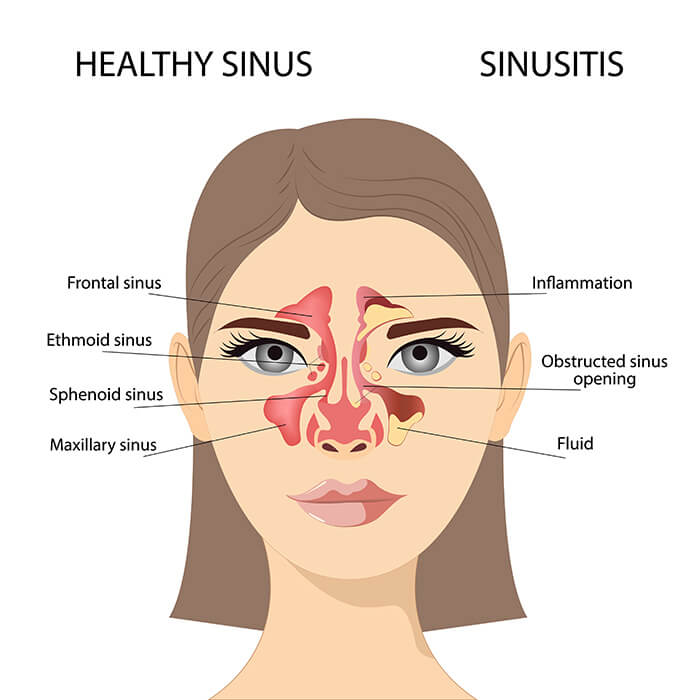Sinusitis Seattle
Nearly everyone has suffered from a sinus infection. For most, this will pass just like a cold or other temporary illness. However, for around 11% of the population, sinusitis will become a recurring problem. Chronic forms of sinusitis can begin to interfere with your work and life as well as lower quality of life. Dr. David Santos of Sinusitis In Seattle treats a variety of sinus conditions and disorders using surgical and non-surgical methods. With state-of-the-art techniques and decades of experience, Dr. Santos provides the best treatment for sinusitis Seattle offers.
OVERVIEW: WHAT IS SINUSITIS?
Sinusitis is a condition where the sinus cavities become inflamed. The condition may also involve an infection. In their normal and ideal state, the sinus cavities are air filled and produce mucus. This mucus keeps the nose from drying out and protects the nose and your body from infections.
During sinusitis, the sinuses become inflamed and blocked by mucus and fluid. This can cause several problems and symptoms. There are also many causes of sinus blockage. As with most cases, this should clear by itself within a couple of weeks. However, some patients may experience prolonged or worsened symptoms. This is when you should seek the expertise of a specialist.
Anatomy Of The Sinuses
The sinuses are connected, hollow cavities in the skull. The four main sinus cavities are:
- Maxillary Sinuses: Located in your cheekbones, the maxillary sinuses are the largest of the four main cavities. They measure about an inch across.
- Frontal Sinuses: Encompassing the lower middle forehead, these sinuses develop throughout childhood and are responsible for increased mucus production during puberty.
- Ethmoid Sinuses: Located between your eyes, the ethmoid sinuses are part of the ethmoid bone. This sponge-like bone separates the nasal cavity from the brain.
- Sphenoid Sinuses: Found in the sphenoid bone near the optic bone, the sphenoid sinuses sit the furthest back in the skull.
All of the sinus cavities drain into the nose and are connected via nasal cavities. When working normally, the draining should not come out of your nose and simply keep the inside moist. Generally, you will not notice your sinuses until they become dysfunctional.

Symptoms
There are many signs and symptoms of a sinus infection. When sinusitis becomes chronic, more symptoms may appear and others can worsen. Signs and symptoms include:
- Sore throat
- Post-nasal drip (mucus running down the back of the throat)
- Cough
- Nasal discharge (runny nose)
- Stuffy nose
- Facial swelling
- Headache
- Facial pain or pressure (especially around the cheekbones, eyes, and nose)
- Loss or reduction of smell and taste
- Bad breath
- Hoarseness
- Fever
- Fatigue
- Tooth pain
Sinusitis can have varied symptoms based on the person, type, cause, and factors of the environment. Extremely mild cases may have few symptoms. Furthermore, your symptoms and treatment are often dependent on the possible cause.
Possible Causes
The cause of a specific case of sinusitis–especially when chronic–is not always evident. However, there are many possible causes. When diagnosing sinusitis, regardless of type, Dr. Santos will try to pinpoint the cause. This will let him best treat the condition and provide long lasting relief from symptoms.
Additionally, certain people may be more likely to get sinus infections. Medical conditions and environments can put some people at a higher risk of sinus infections and developing chronic sinus problems. Some of the causes and risk factors of sinusitis include:
- Asthma
- Cystic fibrosis
- Secondhand smoke (especially for children)
- Suppressed immune system
- Recent cold or upper respiratory infection
- Allergies
- Hay fever
- Deviated septum
- Nasal polyps
TYPES OF SINUSITIS
The condition is broken into three main types. The types of sinusitis are classified based on the amount of time you have experienced symptoms. Also, symptoms also tend to change or worsen with each type. When you meet with Dr. Santos, he can determine the type of sinusitis you have experienced and detail a treatment plan.

Acute:
Acute sinusitis accounts for the majority of sinusitis infections. More commonly known as a sinus infection, acute sinusitis can last up to four weeks. Most of the time acute sinusitis will clear without antibiotics or prescription treatment within two weeks. Symptoms can range during an acute sinusitis infection and it may include more severe symptoms such as a fever.
Sinus specialists do not usually treat acute sinusitis unless it becomes especially severe or recurrent. However, if you experience multiple acute sinusitis infections every year, you may still want to seek out an ENT doctor in Seattle.
Subacute:
Subacute sinusitis classes symptoms that can last up to three months. When acute sinusitis lasts more than four weeks, it becomes subacute sinusitis. This is common with bacterial sinusitis or those who experience seasonal allergies. Subacute sinusitis may or may not require antibiotics or specialist intervention.
If your symptoms worsen, or you have multiple instances of subacute sinusitis every year, you may consider meeting with Dr. Santos to discuss your options for treatment. When left untreated, subacute sinusitis can become chronic sinusitis.
Chronic:
Chronic sinusitis occurs when sinusitis symptoms do not clear up after three months. This can happen due to poor treatment, misdiagnosis, or seemingly no obvious reason. Many people who develop chronic sinus problems will have other medical problems such as allergies or asthma that contribute.
During chronic sinusitis, symptoms usually disrupt work and daily life. They become more resistant to home remedies. Chronic sinusitis symptoms may be less severe, but more persistent. For example, a fever is unlikely to be a symptom for the months a patient experiences chronic sinusitis symptoms. Yet, they may get frequent headaches or always have a runny nose.
Treating chronic sinusitis often requires an Ear, Nose, and Throat doctor and sinus specialist like Dr. David Santos. If non-surgical, conservative treatments do not provide adequate relief, Dr. Santos can perform sinus surgery.
SINUSITIS TREATMENT
Sinusitis treatment will usually begin with a primary care doctor. As it becomes more persistent or severe, Dr. Santos can offer more specialized care. First, Dr. Santos will likely recommend trying non-surgical methods of treatment. He will also try to determine the exact cause of your sinusitis.
Finally, if a structural abnormality or nasal polyps are the cause of your Seattle sinus problems, sinus surgery may become necessary to adequately treat your symptoms.
Non-Surgical Sinusitis Treatment:
Non-surgical treatment may include home remedies, over-the-counter medications, and some prescription medications. Examples of non-surgical sinusitis treatment are:
- Nasal irrigation
- Drinking more water
- Use of a humidifier
- Nose spray (over-the-counter or prescription)
- Over-the-counter pain relievers
- Medications to thin mucus
- Antibiotics
- Warm compresses
Surgical Sinusitis Treatment:
Sinus surgery becomes an option in certain situations. For example, if the physical structure of the sinuses or nasal cavities are the cause of your sinus problems. Also, when nasal polyps are blocking the nasal passages or sinuses, surgery can remove them. Finally, if no non-surgical therapies improve your symptoms, Dr. Santos may opt for surgery. In general, there are three types of sinus surgery:
- Endoscopic Sinus Surgery: A surgery that drains the sinuses and removes blockages with the use of an endoscope. Typically, a non-invasive procedure. It limits or eliminates the need for external incisions.
- Balloon Sinus Surgery: This surgery widens the sinus cavity if it is too small or narrow. Dr. Santos may also drain the sinuses and wash out any build up.
- Stealth Sinus Surgery: Like an endoscopic surgery, stealth sinus surgery uses imaging technology to limit the need for external incisions. It may drain and restructure the sinus cavities.
FREQUENTLY ASKED QUESTIONS
Is Sinusitis Contagious?
Generally, yes. People usually acquire sinus infections from a virus or bacteria both of which can be spread between people. Although, many viruses can develop into a sinus infection, including those that cause the common cold. Additionally, many people who develop sinusitis do so from another infection or cold. Therefore, if the illness that caused the sinus infection is communicable, it could spread to another person.
To catch a sinus infection from someone else, you must first catch the microbe that caused the infection. Then, it must reach the sinuses. It is possible to catch the original illness, but not experience sinus problems or infection.
Will Sinus Surgery Permanently Cure Sinusitis?
Sinus surgery is often the most effective and permanent solution for people suffering from chronic sinus problems. Depending on the cause of your sinus issues, changes in your environment, and other factors, you can get sinusitis again. In most cases, sinus surgery can prevent future chronic and recurrent issues.
Is Sinusitis A Virus?
Sometimes. Sinusitis can also be caused by bacteria and fungi too. The majority of sinus infections are caused by a virus.
Will It Go Away On Its Own?
In most cases, yes. When sinusitis is acute or caused by a virus, home remedies can keep you comfortable as the virus runs its course. If caused by bacteria, you may require antibiotics. Nevertheless, most acute sinus infections will clear up without major treatment within ten to fourteen days.
Why See An ENT In Seattle?
When suffering from chronic sinus problems, an Ear, Nose, and Throat doctor can use their expertise to create a customized treatment plan. General doctors can provide advice and relief from most routine sinus problems. However, chronic sinusitis requires a specialist with a deeper understanding and specialization in the sinuses.
THE BEST ENT DOCTOR FOR SINUSITIS TREATMENT IN SEATTLE
Sinusitis In Seattle is a premier Ear, Nose, and Throat clinic that performs evaluation and treatment of sinus problems. Dr. David Santos uses both surgical and non-surgical techniques to provide the best sinusitis treatment in Seattle. At a consultation, he will assess your symptoms and create a plan designed to provide the best possible relief.
Dr. David Santos is an ENT surgeon with decades of experience in sinus surgery. Having performed hundreds of sinus procedures, Dr. Santos is the best sinus surgeon in Seattle. To schedule an appointment, call us at (206) 242-3696 or contact us online.
Contact Us
